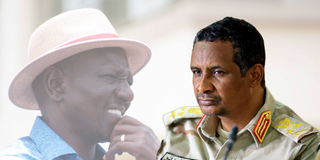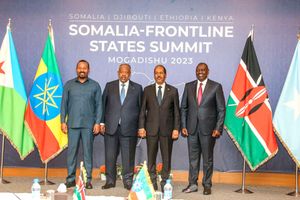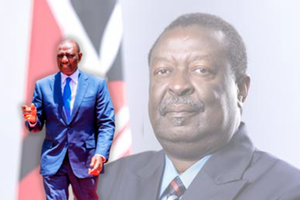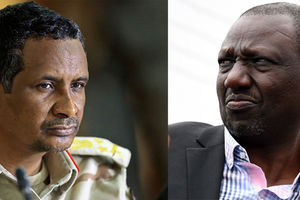
Kenyan-branded ammunition in Sudan’s war-ravaged capital, Khartoum,raising serious questions about Kenya’s potential role in a conflict that has devastated the country.
Revelations that Kenya’s military arsenal is being used in the Sudan civil war have sparked intense debate online and offline, with leaders and the public calling for a public inquiry and accountability.
The exposé, "Brothers in Arms," a joint investigation by the Nation and Bellingcat revealed crates of ammunition belonging to Kenya's Ministry of Defence in deports formerly owned by the Rapid Support Forces (RSF) in Sudan’s capital, Khartoum.
Damning discovery
The presence of the ammo raised concerns about Nairobi’s potential violations of international arms embargoes on Sudan and sanctions imposed on RSF leader Mohamed Hamdan Dagalo, alias Hemedti.
The investigation has elicited mixed reactions, with Kenyans and international observers expressing shock, anger, and scepticism.
Many Kenyans on X (formerly Twitter) demanded accountability, questioning how Kenyan ammunition could have reached Sudan’s conflict zones.
"The damning revelation by NTV dubbed #BrothersInArms is of grave concern that State House Nairobi is an active crime scene!" @robert_bariu tweeted.
"The discovery of Kenyan-labelled ammunition in Sudan’s conflict is deeply alarming. Arms meant for national security must never fuel regional bloodshed. Those responsible must be held accountable. Kenya must reaffirm its commitment to peace, not war profiteering. #BrothersInArms," posted @PrinceDanMburu.
Some of the X users were deeply concerned about Kenya's reputation, as a country once viewed as a regional peacemaker, now being in the heart of a brutal civil war that has so far claimed more than 61,000 lives and displaced over 12 million.
Official denial, swift deletion
But in response to the investigation, Government Spokesperson Isaac Mwaura on Monday issued a statement, denying Kenya's involvement in the bloodletting.
In a statement, which was later deleted, Mr Mwaura attempted to emphasise the country's role as a neutral peace advocate.
He also pointed out what he claimed was the support provided by Egypt and the United Arab Emirates to the warring parties in Sudan.
He stated, “Kenya has facilitated the 2005 Comprehensive Peace Agreement and has supported Sudan’s democratic transition since 2019 through African Union (AU) and IGAD mediation.”
However, his mention of Egypt and the UAE's roles in the conflict drew attention, with some interpreting it as an attempt to deflect the seriousness of the matter and escape responsibility.
"Kenya is committed to peace in Sudan. However, other nations like Egypt and UAE are openly supporting different sides, worsening the war," Mr Mwaura had tweeted.
This statement was quickly removed, raising questions about whether it was an official position or an accidental admission. Some speculated that the government retracted it to avoid diplomatic fallout.
People's Liberation Party (PLP) leader Martha Karua, in a post with an image of what seems to have been Mwaura’s post, questioned the government’s credibility.
“Why was this deleted?”
Other X users accused the authorities of attempting a cover-up. One comment noted that the deleted claim only amplified suspicions, labelling it “proof they have something to hide.”
Diplomatic fallout
The investigation put Kenya’s government in the spotlight of arms support to a war-torn country, with pressure mounting for an official inquiry.
According to the United Nations, any form of support that enables the conflict in Sudan— be it political endorsement, covert arms transfers, or hosting RSF leaders — directly undermines ongoing international efforts to end the war.
Such actions not only violate existing arms embargoes but also breach long-standing diplomatic protocols meant to prevent further destabilisation in the region.
The US has also voiced strong concerns, warning that Kenya’s association with the RSF could jeopardise its diplomatic standing.
Washington, DC has hinted at the possibility of sanctions or the withdrawal of key development and security assistance should Nairobi continue down this path.
“The US is deeply concerned by reports that the RSF and aligned actors have signed a ‘transitional constitution’ for Sudan,” the State Department’s Bureau of African Affairs cautioned on March 5.
“Attempts to establish a parallel government are unhelpful for peace and security and risk further instability and de facto partition of the country.”
The African Union has echoed these warnings, stating that Kenya’s perceived alignment with one of the warring factions could sabotage regional mediation efforts and weaken collective peace-building frameworks.








